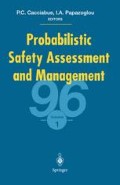Abstract
This paper summarizes an analytical process for performing an HRA in the context of a Probabilistic Risk Assessment (PRA), that addresses the major deficiencies of current HRA methods. This analytical process is being developed using the concepts captured in a multidisciplinary HRA framework [1], and is supplemented with the experience obtained from the analysis of historical nuclear power plant (NPP) events [2]. Both the framework and its application to the analysis of NPP events are earlier products of the HRA development project initiated by NRC in response to the recognized need for an improved, more realistic, approach to the modeling of human-system interactions. The analytical process is the application phase of a new approach to human reliability analysis called ATHEANA (A Technique for Human Error Analysis), which is based on an understanding of why human-system interaction failures occur, rather than on a behavioral, phenomenological description of operator responses, and represents a fundamental change in the approach to human reliability analysis.
Access this chapter
Tax calculation will be finalised at checkout
Purchases are for personal use only
Preview
Unable to display preview. Download preview PDF.
References
Barriere, M.T., W.J. Luckas, Jr., J. Wreathall, S.E. Cooper, D.C. Bley, and A. Ramey-Smith, “Multidisciplinary Framework for Analyzing Errors of Commission and Dependencies in Human Reliability Analysis,” NUREG/CR-6265, August 1995.
Barriere, M.T., W.J. Luckas, D.W. Whitehead, and A. Ramey-Smith, “An Analysis of Operational Experience During LP&S and A Plan for Addressing Human Reliability Assessment Issues”, NUREG/CR-6093, Brookhaven National Laboratory: Upton, NY and Sandia National Laboratories: Albuquerque, NM, 1994b.
Barriere, M.T., S.E. Cooper, G.W. Parry, D.C. Bley, J. Wreathall, W.J. Luckas, Jr., and A. Ramey-Smith, “Development of An Improved Approach for Human Reliability Analysis, Volume 1” Draft NUREG/CR-6350, December 1995
Mosleh, A. et al. “Procedures for Treating Common Cause Failures in Safety and Reliability Studies” NUREG/CR-4780, Vol. 1, 1988, Vol. 2, 1989.
Author information
Authors and Affiliations
Editor information
Editors and Affiliations
Rights and permissions
Copyright information
© 1996 Springer-Verlag London
About this paper
Cite this paper
Barriere, M.T., Ramey-Smith, A., Parry, G.W. (1996). An Improved HRA Process for Use In PRAs. In: Cacciabue, P.C., Papazoglou, I.A. (eds) Probabilistic Safety Assessment and Management ’96. Springer, London. https://doi.org/10.1007/978-1-4471-3409-1_22
Download citation
DOI: https://doi.org/10.1007/978-1-4471-3409-1_22
Publisher Name: Springer, London
Print ISBN: 978-1-4471-3411-4
Online ISBN: 978-1-4471-3409-1
eBook Packages: Springer Book Archive

